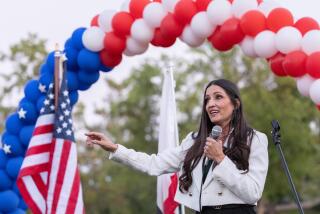Advocate of Educational Programming Returns to Fight in the Digital TV Era
- Share via
WASHINGTON — In March, when the United Church of Christ decided to reopen its Washington office for the first time in a decade, it didn’t hire a man of the cloth. It went for a woman with an agenda.
Gloria Tristani, the 50-year-old granddaughter of a U.S. senator and a onetime Democratic Senate candidate herself, was an outspoken FCC commissioner in the late 1990s.
More than once, Tristani complained that the Federal Communications Commission wasn’t doing enough to safeguard the nation’s youths from violent programming. She bluntly challenged the entertainment industry to “stop violating the minds of our children.”
Today, Tristani attends her first FCC meeting since leaving office two years ago, but she remains a fierce champion of media reform. This time, she’s pushing for more children’s educational programming on digital television -- shows such as “Blue’s Clues” and “Dora the Explorer” -- and insiders predict a key vote will go her way.
For the last several weeks, Tristani and the church have joined with other citizens’ groups to argue that the broadcast industry should not be allowed to skirt rules that require three hours of educational programming a week.
They say that because digital technology allows broadcasters to “multicast” as many as five different channels simultaneously, each channel should be held to the existing standard -- in other words, a total of as much as 15 hours weekly.
For their part, broadcasters want to cap the requirement at three hours, regardless of how many channels are being aired at the same time. They say that what the church is seeking is unfair, in part because cable and satellite TV providers face no similar mandate.
A decade ago, the government gave broadcasters $70 billion worth of airwaves so that they would offer programming with super-sharp pictures and compact-disc-quality sound. About 1,400 of the nation’s 1,700 TV stations have converted to the technology, according to the FCC.
But stations have been reluctant to relinquish their old analog channels, fearing that millions of consumers will not buy expensive digital TV sets.
Yet soon, broadcasters may have to. On Wednesday, FCC Chairman Michael K. Powell endorsed a 2009 deadline for TV broadcasters to switch to the digital format. “I’m saying it really strongly,” he told reporters.
With the digital crossover fast approaching, Tristani asserted that viewers -- especially kids -- need protection.
“Some may call us ... dinosaurs,” she said Wednesday. “But TV stations don’t get their licenses for free. They have to serve the public interest.”
Powell, she added, “believes firmly that the marketplace takes care of these issues. I do not.”
In the six months since being hired, Tristani has made the church into something it hasn’t been for a decade -- a player in Washington. Last week, it joined with the Center for Digital Democracy to challenge the license renewal applications of two TV stations, alleging that they had failed to air enough educational programming to meet FCC requirements. More such challenges are likely.
The return of Tristani, a lawyer and grandmother who was born in Puerto Rico, comes amid a widespread backlash against media consolidation, violent programming and indecency. Before the FCC voted in 2003 to relax its long-standing media- ownership rules, citizens inundated the agency with more than 2.5 million letters, e-mails and faxes.
The climate seemed right for the 1.3-million member United Church of Christ to tap Tristani and resurrect its capital office.
The furor last year over media ownership “was a watershed,” said Tristani’s boss, the Rev. Robert Chase. “It is now a front-burner issue.”
The Cleveland-based church’s efforts to reemerge as a leader in the broadcasting arena come 40 years after it helped launch the modern-media public interest movement.
In 1964, the Rev. Everett C. Parker sued two Jackson, Miss., TV stations, alleging that their exclusion of African Americans from the airwaves violated the FCC’s Fairness Doctrine and was not “in the public interest” of black or white viewers.
The case cemented the notion that “the public has a right to be a party and can participate in FCC matters that have an impact upon them,” said former FCC Commissioner Nicholas Johnson. “That was a major breakthrough.”
Whether the church and Tristani will have the same sort of effect on digital television remains to be seen. Tristani acknowledged that fighting the powerful broadcasting industry is daunting.
“I remember, as a commissioner, that for every 100 industry lobbyists that came through my door, there were only one or two public interest groups,” she said.
Still, Tristani is hopeful that the FCC can be spurred to protect young viewers, given the public’s growing outrage.
“Even in this age of new media like the Internet, the average kid still watches three hours of TV a day,” she said. “That’s why these issues are so important.”
More to Read
The biggest entertainment stories
Get our big stories about Hollywood, film, television, music, arts, culture and more right in your inbox as soon as they publish.
You may occasionally receive promotional content from the Los Angeles Times.










